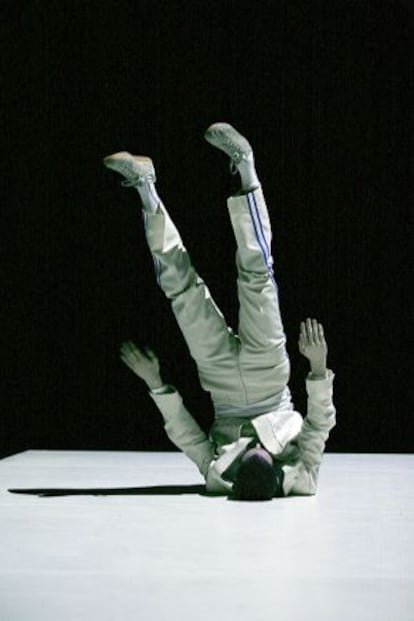Theater and live music in freefall
Dance is worst hit, says industry report, with no respite in sight

Let's not beat about the bush: the situation is desperate. According to the latest edition of the SGAE royalties management organization's Anuario de las artes escénicas, musicales and audiovisuales (Annual report on the performing, musical and audiovisual arts), the whole of Spain's cultural goods and services industry is directionless and in freefall. And some sectors, such as dance, are plummeting to such a degree that they are at risk of "disappearing," in the words of Francisco Galindo, the secretary of the SGAE Foundation.
"The situation is difficult," says SGAE Foundation president Antonio Onetti. "We're talking about a year in which there has been a significant drop in all the industries related to culture, in many cases of around 10 percent, capping off a terrible five-year period in which we have lost 30 percent of the performing arts sector."
From the very first sentence, the tone of the report is revealing: "In 2012, for another year, declines are reported in all areas of the culture sector analyzed." What follows are 40 pages of bad news, broken down activity by activity. In theater, comparing the 2012 data with that of the year before, the drop was 10.44 percent: 9.8 percent in attendance and 8.32 percent in earnings. "Theater has declined in all the indicators that exist," says Onetti. The SGAE Foundation head is not even confident that the stimulus the government has given the sector in the 2014 budget will make a difference.
In cinema, the amount of showings has fallen 10.95 percent with a 13.51-percent decline in the number of moviegoers, though box-office takings have only dropped 1.82 percent as a result of an increase in ticket prices.
The possibility of dance disappearing in Spain is not an exaggeration"
There were 116,446 music concerts held in Spain last year, 4.3 percent fewer than in 2011, with 26 million attendees and earnings of 171.7 million euros in a sector that is being seriously affected by the decline in the number of bookings by the public sector as festivals close.
The number of people attending performing arts shows has fallen 31.4 percent in the last five years, while the amount of moviegoers has dropped 11 percent. The report says there has been a 27-percent fall in the number of performing arts performances since 2008.
But as notable as they are, all these declines are a long way from the one suffered by the world of dance, which has seen a 43.41-percent fall in the number of performances. "As soon as you separate the activities that are usually the most minority ones, there is a real possibility of them disappearing. In the case of dance, it is not an exaggeration."
The report emphasizes that the accumulated decline of the last five years is of sizeable proportions and the negative trend is continuing. "The combined elements - which now seem structural - such as the drop in public sector budgets and the falls in the levels of audience income, seem to indicate that the trend will not change in the next few years."
The scene the report describes is one of a fish biting its own tail: income from the audience declines at the same time as the prices of cultural goods and services go up, in large part because of the huge increase in the value-added tax (VAT) rate on tickets introduced in September 2012. That drives down demand and the consequence is a decline in the number of shows available and all that this "entails for the professional fabric of the cultural sector." For the authors of the report, this proves that the culture industry in Spain is "surviving in an abandoned state and needs government policy."
The fact that the fall in cultural consumption is the result of a decline in people's purchasing power is clearly seen by the increase in consumption of free cultural options. Television and radio audiences are both up, says the report: in 2012 people watched an average 246 minutes of television a day compared with 239 minutes the year before, while the average amount of time spent listening to the radio rose from 110 to 114 minutes.
Onetti says the VAT hike has been "the final blow to the sector." This week, he appealed to "the conscience of a government that, among other things, has to confirm that the impact on the tax agency's level of income has been negative. Less was collected after the increase. The VAT [hike] is damaging for the industry and the users. If it has an effect on the price of tickets at a time of crisis, unemployment, loss of income... consumption is put off."
Tu suscripción se está usando en otro dispositivo
¿Quieres añadir otro usuario a tu suscripción?
Si continúas leyendo en este dispositivo, no se podrá leer en el otro.
FlechaTu suscripción se está usando en otro dispositivo y solo puedes acceder a EL PAÍS desde un dispositivo a la vez.
Si quieres compartir tu cuenta, cambia tu suscripción a la modalidad Premium, así podrás añadir otro usuario. Cada uno accederá con su propia cuenta de email, lo que os permitirá personalizar vuestra experiencia en EL PAÍS.
¿Tienes una suscripción de empresa? Accede aquí para contratar más cuentas.
En el caso de no saber quién está usando tu cuenta, te recomendamos cambiar tu contraseña aquí.
Si decides continuar compartiendo tu cuenta, este mensaje se mostrará en tu dispositivo y en el de la otra persona que está usando tu cuenta de forma indefinida, afectando a tu experiencia de lectura. Puedes consultar aquí los términos y condiciones de la suscripción digital.








































